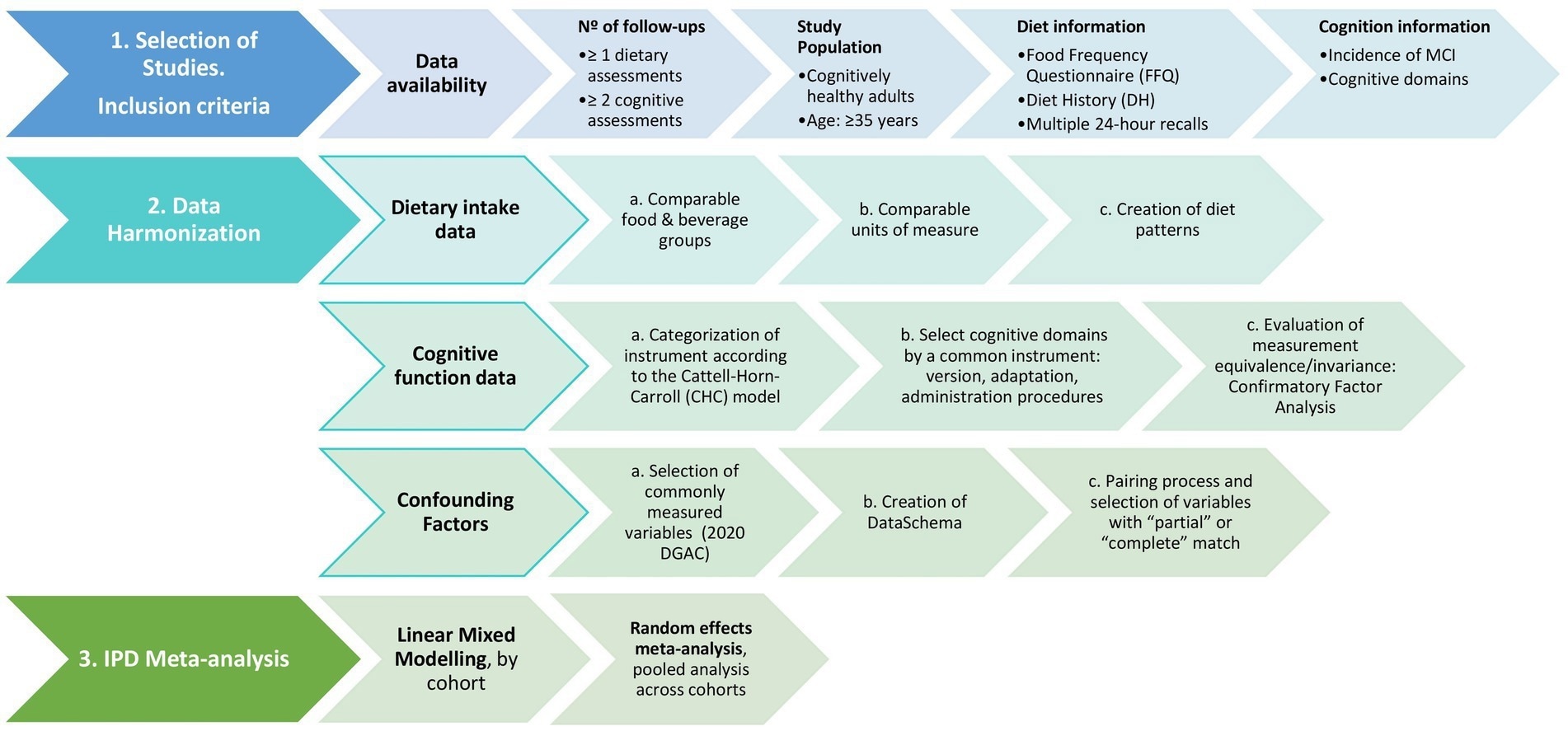
[ad_1]
In a current research revealed within the journal Frontiers in Nutrition, researchers developed a technique to retrospectively harmonize information on the affiliation between dietary patterns and cognitive well being from particular person research that modify extensively within the methodologies and outcomes.
 Review: Diet patterns associated with cognitive decline: methods to harmonize data from European and US cohort studies. Image Credit: Elena Eryomenko / Shutterstock
Review: Diet patterns associated with cognitive decline: methods to harmonize data from European and US cohort studies. Image Credit: Elena Eryomenko / Shutterstock
Background
A rising space of analysis is the affiliation between dietary patterns and cognitive well being, particularly associated to understanding the modifiable danger elements for dementia and different neurodegenerative illnesses. Findings from numerous opinions and meta-analyses have discovered that diets wealthy in fruits, complete grains, and greens are useful for cognitive well being.
However, findings from particular person research about dietary patterns such because the Dietary Approach to Stop Hypertension (DASH), Mediterranean, anti-inflammatory, and Mediterranean-DASH food regimen Intervention for Neurodegenerative Delay (MIND) diets have been inconsistent. These inconsistencies, stemming from heterogeneity within the strategies for conducting dietary and cognitive assessments, research populations, follow-up durations, and numerous different research parameters, have made it difficult to conclude potential dietary tips for cognitive well being.
A proposed method to attract inferences from these heterogeneous particular person research entails pooling particular person participant information from numerous medical and observational trials, much like a meta-analysis. It differs from a meta-analysis in that the info is sought from the eligible research slightly than extracted from the publication. However, a technique of harmonizing the info continues to be required to make sure comparability and compatibility throughout the info.
About the research
The current research described a protocol for retrospectively harmonizing particular person participant information from quite a few research from the United States (U.S.) and Europe on the affiliation between dietary patterns and cognitive well being. They additionally mentioned the research choice standards to deal with the research query and offered definitions for the outcomes and exposures of the research.
Harmonization of knowledge
To decide the associations between dietary patterns and the incidence of cognitive decline and gentle cognitive impairment, the choice standards stipulated the inclusion of research that examined diets consultant of various populations throughout the U.S. and Europe, with the research design being both a medical trial or a potential cohort research. Only research performed on adults above the age of 35 who have been cognitively wholesome have been to be included within the harmonization evaluation. Sensitivity analyses have been advisable to evaluate the interactive results of comorbidities corresponding to weight problems, heart problems, diabetes, despair, and bodily exercise.
The exposures thought of for the evaluation comprise dietary patterns corresponding to variations of the Mediterranean food regimen sample, EAT-Lancet sample, the Healthy Eating Index, or a sample derived a posteriori from the outcomes of a principal element evaluation. Diet historical past, meals frequency questionnaires, or information from repeat interviews can be used to find out the each day meals consumption scores.
The outcomes for the evaluation include cognitive efficiency assessments at two time factors to find out modifications in cognition or the event of gentle cognitive impairment. The information on dietary patterns can be harmonized into teams of meals and drinks corresponding to dairy, greens, fruits, meat, sweet, and sugar-sweetened drinks.
The researchers additionally advisable making certain that the items used report the vitamins have been transformed to at least one unit and reported together with the variety of grams in a single serving of every meals class. The harmonized dietary information would consist of 1 publicity variable for wholesome dietary patterns, reported when it comes to a rating such because the Healthy Eating Index.
The proposed methodology for harmonizing particular person participant information instructed that solely these devices of cognitive measures that may probably diagnose gentle cognitive impairment or measure government operate, verbal fluency, and verbal reminiscence be included within the evaluation. Additionally, the cognitive information must be harmonized utilizing pre-statistical harmonization to categorize the cognitive checks from every research in keeping with the cognitive talents being examined.
 Schematic research protocol to evaluate the affiliation between food regimen patterns and cognitive decline.
Schematic research protocol to evaluate the affiliation between food regimen patterns and cognitive decline.
Data augmentation methods have been instructed to deal with doable heterogeneity throughout elements corresponding to administration of cognitive measurements, instrument adaptation, parts, and instrument model. Furthermore, a confirmatory issue evaluation will probably be used to check the equivalence of the cognitive measurements.
The research additionally mentioned strategies to harmonize information on confounding elements corresponding to existence, bodily exercise, sociodemographic elements, anthropometry, and bodily exercise ranges. The harmonized information on dietary consumption, cognitive measures, and confounding elements will then be used to find out the affiliation between food regimen and cognitive well being via a person participant information meta-analysis.
Conclusions
To summarize, the research offers a technique to harmonize information from quite a few heterogeneous research in order that the research design can infer the affiliation between dietary patterns and cognitive well being. The software of this methodology and the findings will assist formulate dietary steering suggestions to enhance cognitive well being and forestall cognitive decline.
[adinserter block=”4″]
[ad_2]
Source link